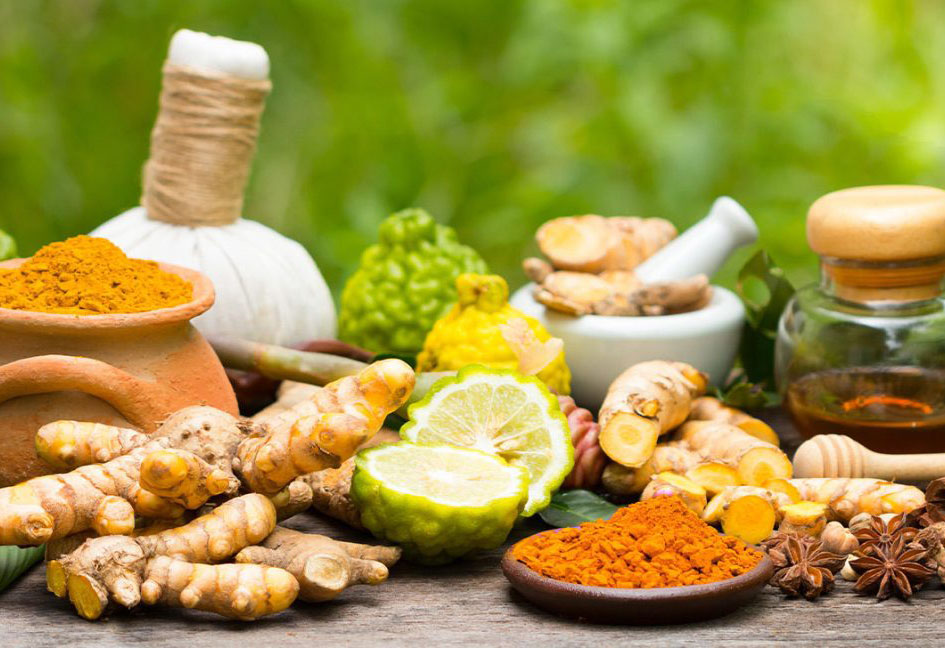Benefits of the Top 10 Ayurvedic Herbs & Spices
EXPLORING THE SIGNIFICANCE OF AYURVEDA AND AYURVEDIC HERBS
By: Vivek Roy
The traditional Indian system of medicine, guarding health and wellness, offering solution for all the diseases, Ayurveda preserves the body, mind and health in any or all circumstances with its’ variety and natural spirit.
For Ayurveda to work its’ course, various Ayurvedic herbs and spices are entrusted to host benefits, nutrients, and body-friendly components that works from health to taste.
AYURVEDIC HERBS AND SPICES
The ayurvedic herbs are derived from a plant source, where the leaves, flowers, fruits, seeds, roots, bark and resin are used to prepare medicines and balance body and health.
Some of the ayurvedic herbs and spices that carry this prestigious place are as follows:
1. TURMERIC – The yellow mellow as it can be said, justifies its name with its wide range of nutrients and benefits, and years of reliability on its shoulders.
Nutrients – Turmeric contains various anti-inflammatory and anti-oxidant properties, topped up protein, fats and fiber.
Benefits – Thus, backed by the powerful properties, the ayurvedic spice enhances skin tone, complexion, texture, builds a strong immune system and provides nutrients to skin and body, in both culinary or cosmetic forms. Apart from which, turmeric also has the ability to act medicinal, treating cough, cold, and body weakness.
2. ASHWAGANDHA – A highly regarded Ayurvedic treasure, Ashwagandha has a strong aroma and is said to bestow upon its users the vitality and strength of a horse.
Nutrients – Containing healthy amounts of fats and fibre, the herb contributes to the diet, while also providing other medicinal value with it’s anti-oxidant and anti-inflammatory properties.
Benefits – As the benefits provided to the body, Ashwagandha supports weight management, provides nourishment to body tissues, enhances cognitive ability, and reduces stress and anxiety to a great extent.
3. TRIPHALA – Triphala is a powerful ayurvedic spice and contains three medicinal fruits, a) amla, b) bibhitaki, c) haritaki, which enriches the body with a wide array of goodies.
Nutrients – The spice provides anti-inflammatory and anti-oxidant leisure to the body, while vitamin c, sodium and good amount of fibre to the diet. It further benefits the body with compounds like gallic acid, chebulagic acid, and chebulinic acid.
Benefits – reduces constipation and abdominal pain, help conditions like arthritis and provides dental care, suits the digestive system, aids heartburn, helps in weight management, and boosting metabolism.
4. CUMIN – The spice known for distinctive earthy, nutty and spicy flavor is a strong addition to the body and health.
Nutrients – Containing strong amount of calcium and iron, cumin is also anti-microbial and anti-inflammatory. It additionally hosts several healthy plant compounds including terpenes, phenols, flavonoids and alkaloids.
Benefits – The powerful plant compounds acts as an antioxidant guard for the body (helping in oxidation of the body), improves blood cholesterol, promotes weight loss, increases the digestive activity while also reduces the risk of certain foodborne infections.
5. GOTU KOLA – Known as the ‘herb of longevity’, the Ayurvedic remedy is made from taste-and-odorless plant with fan-shaped green leaves that grows in and around water.
Nutrients – The longevity herb is a well-known anti-depressant, which also houses Vitamin A, C and B2, Iron, potassium, and calcium.
Benefits – The variety of help gotu kola provides ranges from improving memory, helping in coping with stress or anxiety, helping in wound healing, promoting bone health, diminishing symptoms of eczema and psoriasis and boosting cognitive function.
6. CARDAMOM – One of the ancient and trusted spices in the world, Cardamom has a strong aroma like that of cloves and is used in Indian and Middle Eastern cuisine.
Nutrients – Cardamom has anti-oxidant, anti-inflammatory and diuretic properties, Vitamin C and B6, calcium and protein, making it a valuable culinary and medicinal intake.
Benefits – works as a natural tranquilizer, treats indigestion, promotes oral health, lowers blood pressure, prevents inflammation and improves stomach health, justifying the quality of “queen of spices”, as rightly known.
7. BRAHMI – Known by the common name, ‘herb of grace’, Brahmi is the ayurvedic remedy for a number of health ailments.
Nutrients – Apart from sodium, protein, and dietary fibre, the staple herb also has strong anti-inflammatory and adaptogenic properties.
Benefits – The herb has the ability to fight stress and anxiety, improves cognitive functioning, lowers inflammation, while also improving learning skills.
8. NEEM – Neem is believed to be the bestower of good health with its stuffed nutrition and benefits to skin, hair, body and overall health. Furthermore, it has been trusted from over centuries, for its culinary and medicinal properties.
Nutrients – Power-packed neem has glutamic acid, tyrosine, aspartic acid, alanine, praline, glutamine and cystine like amino acids, and several fatty acids (dodecanoic, tetradecanoic and elcosanic), layered with anti-septic, anti-bacterial and anti-fungal properties.
Benefits – With the house-full of nutrients, neem is a trusted source for treating or improving skin health, fighting rashes, wounds and acne. The consumption of neem treats fever, cold, and specially malaria fever. It further also promotes hair growth, protects hair roots, and acts as s conditioner to both skin and hair.
9. AMALAKI – Amalaki is considered as a powerful rejuvenating herb in Ayurveda. More commonly known as ‘amla’, amalaki poses several health amenities for skin, hair and health of the body.
Nutrients – Amalaki is entrusted for it’s rich anti-oxidant content, anti-inflammatory properties, Vitamin C, iron, protein, sodium and calcium.
Benefits – The hefty-benefitted herb reduces inflammation, alleviates pain, helps in overall hair quality, growth and improvement, maintain the health of heart and liver, boosts immunity and promotes longevity.
10. ALOE VERA – From plant to gel, aloe vera is known to uplift most of the skin, hair and health requirements. Restoring maximum health, aloe vera is globally even believed by some as the “plant of immortality”, with nutrients, and benefits making it hard to deny so.
Nutrients – Ranging from vitamins A, C, and E, folic acid, enzymes, minerals and amino acids, aloe vera supplies anti-oxidant, anti-inflammatory and antibacterial properties.
Benefits – The competence of aloe vera goes from improving digestive system, increasing energy production, promoting heart health, treating or improving various skin and hair conditions including, acne, dark spots, rough hair or skin, skin toning, reducing inflammation, fighting off infection, and purifying blood.
The herbs and spices are believed to purify body, mind and spirit with each being a trusted hand of Ayurveda.
HOW TO USE
• The herbs and spices can be used topically, culinary, according to their own parameters (check of the same is must) for all the bodily needs.
• They can also be found or used in cosmetic products and can be applied accordingly.
• For any query or experimental use, a check with a health professional is recommended.
CONCLUSION
Working on the principles of Doshas (Vata, Pitta and Kapha), Ayurveda has been a reliable and comprehensive systems of healing and healthcare known to humanity. As Ayurveda works to balance the misbalance of physiological process of the living beings, it can be followed to the ends of the chain, from food or cosmetics, as Ayurveda stands an irreplaceable ground.
ABOUT THE AUTHOR:
Vivek Roy is a trained natural cosmetic practitioner and blogger from India. He loves to write about natural & healthy ingredients and share the knowledge around the world. For more information about him visit his website Zoem Skin Essentials.









